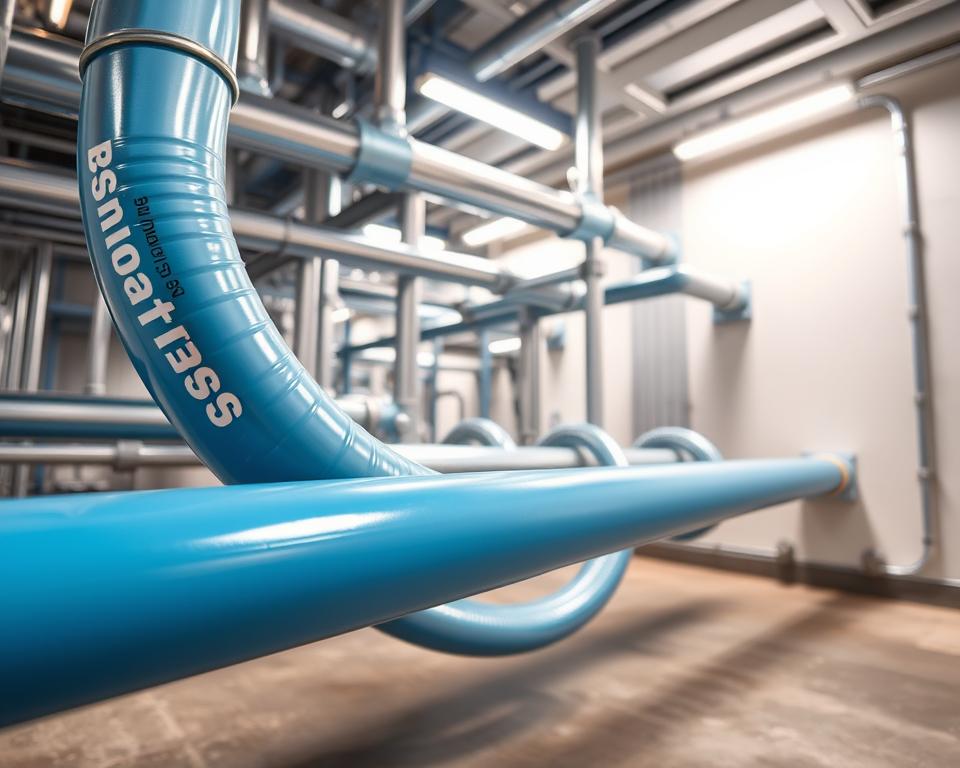PVC Pipe for Air Compressor Lines: Your Complete Guide
A burst compressed air line can discharge energy comparable to a stick of dynamite—did you know? Despite the hazards, numerous workshops continue installing piping systems from unsafe materials. Here’s why you must prioritize safety over cost when selecting PVC air hose.
Although some plastics gain popularity, OSHA flatly forbids their above-ground application. Repeated contact with compressor oil and thermal cycling makes them brittle, causing explosive failures. Safe-rated pressures can still result in deadly bursts.
Installation Parts Supply provides safer options such as aluminum piping. Spending on the right materials prevents OSHA penalties and protects employees. Discover steps to construct a secure system.

Core Lessons
- Explosion danger leads OSHA to outlaw some pipe materials.
- Heat and cold swings slashes claimed pressure capacity.
- Material becomes brittle with age, upping rupture chances.
- Aluminum lines deliver a far safer option.
- Proper investment prevents costly fines and accidents.
Why PVC Pipe Is Dangerous for Compressed Air Systems
Manufacturers explicitly warn against using some plastics for high-energy applications. Compressed air carries destructive energy; a burst is like a dynamite blast. This makes material choice critical for safety.
- Brittleness: Cold snaps make pipe walls brittle and prone to cracking.
- Adhesive failures: Temperature changes and oils cause adhesive joints to fail.
- Misleading ratings: Pressure capacity drops 50% at 110°F—most workshops exceed this.
After a PVC burst hurt staff, OSHA levied a $110,000 fine. Compression heating lowers allowable pressure even more—often ignored.
“Above-ground use of certain plastics for compressed air violates OSHA standards due to explosion risks.”
In contrast, metal pipes deform before bursting. Plastic shrapnel from explosive failures can travel over 50 feet, embedding in walls or equipment.
Daily heat and cold cycles in a workshop degrade plastics rapidly. A decade’s UV and chemical attack weakens plastic, so small leaks too often balloon into disasters.
Best Materials Instead of PVC for Air Lines
Aluminum piping systems outperform traditional options in both safety and efficiency. With 90% fewer leaks than black pipe, they’re a top choice for modern facilities. Aluminum’s lightness and anti-rust traits prolong system life.
Modular aluminum setups save time—no threading required. Installation Parts Supply stocks ready-to-snap aluminum modules. A car plant saw a 40% drop in labor expenses after aluminum installation.
- Copper: Ideal in sterile environments for its germ-killing copper surface. Requires soldering expertise.
- Stainless Steel: Resists rust in humid areas like coastal workshops.
- ABS/HDPE: Chemical-resistant for labs and factories handling solvents.
“Our aluminum retrofit reduced energy waste by 15%—paying for itself in 18 months.”
Proper torque is critical. Over-tightened fittings crack, while loose ones leak. Follow manufacturer specs—typically 25–30 ft-lbs for aluminum joints.
NSF-approved lines keep food-grade air clean. Choose pipe rated for your specific operating environment.
Material Selection Guide for Compressed Air
Balance budget, safety, and performance when choosing pipe. Switching to aluminum saved a factory $12k each year. Here’s how to make the right choice.
| Material | Cost (per ft) | Maintenance | ROI Time |
|---|---|---|---|
| Aluminum | $8.50 | Low | 18 months |
| Black Pipe | $5.00 | High | N/A |
| Copper | $10.20 | Medium | 24 months |
Watch your operating temperatures. Plastics fail under 32°F; aluminum works from -40°F to 200°F. Use stainless steel where solvents are present.
Pro Tip: Compute ROI based on compressed-air leakage. A 10% leak in a 50 HP system wastes $3,500 yearly.
- Don’t undersize—pick pipe rated at or above your compressor’s PSI.
- Verify your system meets OSHA welding and pressure-test rules.
- Request a free system audit from Installation Parts Supply.
“Our aluminum retrofit cut energy waste by 15%—paying for itself in 18 months.”
Hire pros for big installs to guarantee airtight connections. Check warranties—some pipes include decade-long coverage.
As a Final Point
Smart material selection protects life and wallet. Older systems account for 92% of accidents due to degraded piping. Pick aluminum for near-perfect reliability.
Don’t forget:
- Say no to plastics that can explode.
- Choose rust-proof metals over plastics.
- Ignoring standards invites fines and insurance headaches.
Ready to upgrade? Get instant quotes and special offers from Installation Parts Supply. Access a complimentary maintenance template or request urgent replacements.
Commit to safer piping today—your team’s safety depends on it.
